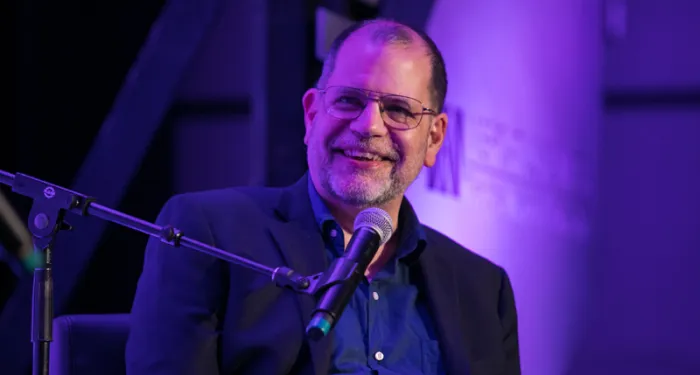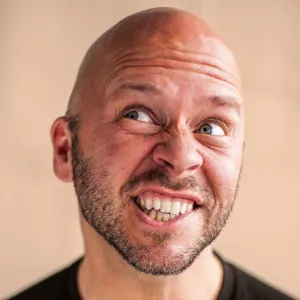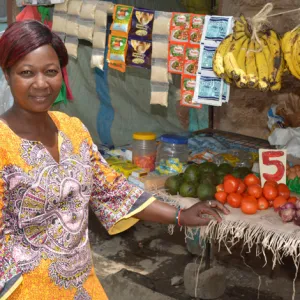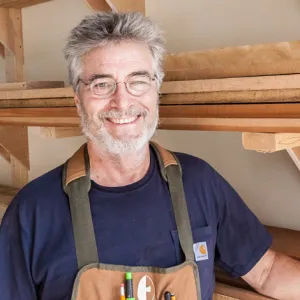
Tyler Cowen
Imparting the Inquiring Mind
Recognized as a global thinker, this brilliant economics professor wants to learn as much as possible — and teach it to you, too.
Tyler Cowen wants to know it all, and he wants to share it with you.
A world-renowned economist and professor at George Mason University, his goal is not only to teach economics, but to encourage people in their everyday lives to be more marginalistic — that is, logically consider how much a resource is worth.
He is also an infovore with a voracious appetite for knowledge across a breathtaking range of subjects. And in true Crazy Good Turns fashion, Tyler has created thousands of places to share — often for free — the knowledge he has gained by devoting his life to inquiry.
Give and Get Genius
Ranked among the top global thinkers, Tyler has spent years blogging daily about an enormous variety of topics at Marginal Revolution, written dozens of books and columns, founded the free education site Marginal Revolution University, and now hosts a podcast called Conversations with Tyler.
In all of these outlets, Tyler offers brilliant insights and invites people to learn how to learn from others.
Some things he'll reveal in this episode include:
- Why sharing knowledge means getting knowledge
- Where Tyler feels he's failed
- How being smart can make you stupid
- What he learned about generosity from his favorite movie
FRANK BLAKE: It's great. And it is, it's terrific to have you on the show, and I'm going to start by asking you about a huge, crazy good turn of yours back in 2012, you and Alex Tabarrok, I hope I'm pronouncing that right, founded the Marginal Revolution University. And it offers a world-class economics education to everyone for free.
TYLER COWEN: That's correct. No advertisements. The videos are all out there. It's like Khan Academy for economics.
FRANK BLAKE: Yeah. Completely free. Why did you do this?
TYLER COWEN: It is my personal ambition to have taught economics, in one form or another, to more people in the world than anyone else, except perhaps for Alex, I suppose. So, we have a blog which is free. I run a podcast, as you mentioned, which is free, and also no advertisement. And Marginal Revolution University, it's the same method. We cover many classes, but we have a fully complete micro class, macro class, much of it made by professional movie makers. We cover the full contents of a textbook. We have interactive exercises. Right now, we're getting about 11 to 12 million views per year, so, to me, that's exciting.
FRANK BLAKE: Wow. And why is it so important for you that people have access to education about economics?
TYLER COWEN: Well, every person should have a mission, right? And I'm not sure you can figure out your proper mission in the abstract. You need to start by asking, "Well, what am I good at? How can I contribute?" And I thought economics is something I have a love for, I've done a lot on the internet, I understand those modes of communication to some extent, and I was in a position to be able to raise the money to fund these videos. And now we're marketing them and also producing more.
FRANK BLAKE: So, it really is a crazy good turn. And for those of you, our listeners, who haven't visited the site, I urge you to visit the site because you have such a great way of expressing complex concepts in a very engaging way. Is there something you've learned about, "Here's what it's like if you do a crazy good turn like this. Here's how people respond," or have they responded differently than you thought? What have you learned in that process?
TYLER COWEN: Well, every day I get a large number of emails, some of them about those videos, but about many different things, and by putting content out there, you make yourself open to the world and people will teach you things in return. So, for me, it's a great deal. I sometimes say I am an information billionaire and I aspire to be an information trillionaire. I don't think I'll ever quite get there, but again, it's important to have these personal missions.
FRANK BLAKE: So, on your blog, you focus on living on the margin, and for those of us who are not economists, what do you mean by that?
TYLER COWEN: Marginalism is a central idea of economics. It just means when you compare values, don't talk about them in the abstract. They ask, "What's the actual choice in front of me? What am I getting? What am I giving up? How's that relative to where I already stand?" It's very simple. It's very intuitive. Especially in public policy, people don't always think in terms of the trade-offs. It's just an argument like, "This is a good value, so we must pursue it and something must be done. This is something. We'll do it." Marginalism is more scientific, more exact, more concrete, always trying to steer our attention toward what is going to work given where we're starting from.
FRANK BLAKE: And do you think most people, as you unfold the concept, they get it or are they resistant to it? How do you find the response to it?
TYLER COWEN: Well, I think almost everyone gets it, and indeed, almost everyone lives it in most of their choices. When they go to the supermarket, "Oh, should I buy a bag of rice? Well, how much rice do we have at home?" Right? Hard to think of many people who can't think that way. But that said, there's another part of the brain that switches on when issues are emotional or involve status ranking or politics, and then that way of thinking flies out the window. I'm just trying to nudge people to be a little more consistent, be more marginalistic, more concrete in a broader set of your choices.
FRANK BLAKE: It flies out the window a lot. We have a lot of life where it flies out the window. Yeah.
TYLER COWEN: So, that, again, so far has been a losing battle for me in many ways.
FRANK BLAKE: Yeah. No, absolutely. So, I said at the start that your podcast, Conversations with Tyler is its own crazy good turn. Briefly, Tyler and I were talking before the start of the podcast, and I said to Tyler that I feel like his podcast is one of the reasons for modern technology, for it allows us to eavesdrop in on a conversation between a really brilliant conversationalist interviewer and a really interesting guest. And I'm wondering, what would you like your listeners to be learning from your podcast?
TYLER COWEN: The key goal of the podcast is to teach people how to learn from others. So, they get to watch me trying to learn from others. I'm not saying they should copy exactly what I do, it's different for every person, but just that general aspiration. I hope some of that sticks. And that's what the podcast is about. The people are also different, the areas, whatever. The common theme is, how can you better learn from other people?
FRANK BLAKE: And when I say you have a wide array of guests, that's an understatement. Recently you've had on Karl Ove Knausgård, who happens to be a favorite author of mine, a Norwegian author, but not a very well-known author. The woman, Emily Wilson, who translated The Odyssey recently. Annie Dukes, the top female poker player. How do you pick the people who are on your podcast?
TYLER COWEN: A first question is, who will say yes? Right? That's very important. So, I'd love to do William Shatner. He hasn't said no, he hasn't yet said yes. That aside, it's who I want to speak to. I'm not paid to do this, so for me, it ought to be fun. I mean, fun in the broad, deep sense of that term. I'm going to learn something, have it be a rewarding experience, and just, I'll be glad that I did it. So, if I don't want to do it, I mean, I'm not going to do it, to put it bluntly.
FRANK BLAKE: And do you have things that you're targeting that you're on a path to learn where you say, "This, I'd like to learn more about translation," or, "I'd like to learn more about how poker players think about odds"?
TYLER COWEN: Absolutely. Or there's particular books I want to learn. Soon, I'm interviewing the author of the new Keynes biography. I want to understand Keynes better. There's a new translation of Virgil's The Aeneid coming out in February. I'm going to ask that woman. She hasn't been asked yet. I want to learn that book better. So, for me, it's a highly effective way to learn. If I know I'm going to be put on the spot, maybe with like 150,000 people listening to me, so I ought not to screw it up too badly. In a disciplined way, I have to go through the information, the knowledge, and somehow organize it and process it. It's better to me than just leaning back in my chair and reading some random book.
FRANK BLAKE: Yeah. Well, as I say, I recommend to all our listeners to check out the podcast. They'll be hooked immediately. One of the notable things is I don't think there's a podcast that you do where one of your guests doesn't say, "Whoa, that's a really interesting question. I never had that question." Is that an objective? Do you go, "Boy, I want the question that they're not exactly expecting"?
TYLER COWEN: It is, but in a way, I think it's sad. I mean, I'm pleased to hear that. It shows most interviews are really quite terrible and predictable and people under-prepare. So, if you write a book yourself, as I've done, you do many interviews from the other side, and the first question is something like, "Can you tell us what your book says?" I mean, that's fine. Right? It's just not that good a question. So, it's a sign the rest of —
FRANK BLAKE: Now, I feel very anxious about coming up with some questions, but no, you're exactly right.
TYLER COWEN: No, you're very well prepared for this. This is obvious. Right? I wonder what a lot of interviews are even about. Just like, well, philanthropy, the motives maybe are complex. When people do interviews, listen to interviews, what do they want? Even podcasts. I think a lot of people just want a soothing voice in the background. That's okay, but I'm aspiring to be something different.
FRANK BLAKE: Well, you've achieved it. It is terrific. In your own life, is there someone who's done a crazy good turn for you?
TYLER COWEN: So, my wife, my daughter, that's obvious, but just throughout my life, I've had incredible mentors. I'm a big believer in mentoring. And even as you get older, you should always have mentors. They might be younger than you, but they're going to know so many things you don't. So, I've had dozens of great mentors in my life and always sought them out, so I'm deeply grateful to all of them.
When I was, I think, 14 years old, I met a guy named Walter Grinder who just had read so many books, and I felt he understood them deeply, as well. The notion that you could have a life devoted to inquiry, I saw realized in his persona. Now, he did do me some favors. I'm grateful for those favors, of course. But the biggest thing I got from him was that vision of what a person can be, and that's often the greatest gift you can give someone, is that you can see their trajectory in a way they cannot. Also in the workplace, a lot of talented employees who don't quite realize how good they could be at something. And if you as their boss or CEO can see that, you can add a lot of value by changing the slope of their line, even if you only interact with them a few times. To me, that's very important, and we under-invest in that.
FRANK BLAKE: Without a doubt. Have you ever said to Mr. Grinder, "This is what you did for me in my life"?
TYLER COWEN: Sure.
FRANK BLAKE: Yeah. And have you had the same said to you?
TYLER COWEN: I have many students and the people I support with Emergent Ventures, it's the same goal of raising their aspirations, putting them on better tracks.
FRANK BLAKE: Let me ask you about your Emergent Ventures project, which, and I'll give my snapshot of it and you tell me if it's right or wrong. But as I understand it, you're giving away a million dollars in grants to people who have just brilliant moonshot ideas. Is that a fair summary of it?
TYLER COWEN: Well, yes. At first, it started at a million but now, it's about 6.4 million, if I have the number right. So, success of early applicants has attracted additional donations. So, most of these go to young people, people with a vision, people who are taking chances, who might not have the ability to raise money from a foundation. There's a short application, you can fill it out in less than an hour, and you get an answer back right away. We don't ever ask where you went to school or for letters of recommendation. It's just, what's your idea, and tell me why it's good.
FRANK BLAKE: And what prompted you to do this? Did you have some issue early in your career where you couldn't get funding, or was somebody talking to you about something? What prompted this?
TYLER COWEN: Well, most of my career I've been able to get some degree of funding. There was a particular episode with a foundation, and the foundation signaled they wanted to give me a grant. They weren't committing to it. They wanted me to do a lot more paperwork. And I looked at the paperwork, and basically, I decided I could earn the money more quickly than I could do the paperwork. It struck me then something was wrong, that we should be encouraging applications, not making them cumbersome and bureaucratic and many pages and with a lot of documentation. And, we make too many decisions by committee, and this was a new channel for people.
FRANK BLAKE: How many grant applications have you gotten, and is there anything surprising about it about them?
TYLER COWEN: Oh, I think the total number now, 1,700 and something, and there are about 100 winners. I mean, each and every one is a surprise. There are relatively few crank applications. We deliberately do not advertise. Finding out about Emergent Ventures is the first puzzle you need to solve, and that should not be made too easy. The geographic concentration of applications is more than I thought it would be. I think this reflects a problem, actually, in the world.
FRANK BLAKE: So, what's the concentration? What is it?
TYLER COWEN: Well, there's a lot of very good applications from the Bay area, from New York, from London, not places that would surprise you. Boston and Cambridge, Oxbridge in England. And I mean, that's fine, those are great, but it does feel to me that the world as a whole is dropping the ball a bit on mobilizing all available talent. And that's actually the topic of my next book. It's how to find talent in out-of-the-way places. Or just trying to find talent.
FRANK BLAKE: That is a needed book. That is a needed book. I can say having spent time worrying about hiring people in the corporate world, that it's a constant issue, and you're exactly right. We tend to go to the same places over and over again. When's that book coming out? That will be great.
TYLER COWEN: I'm not sure. It's not quite finished. I'm co-writing it with a venture capitalist named Daniel Gross. It's well underway, less than two years, but it's not coming in a few months. And with the pandemic, there's a backlog in publishing. I'm not sure how that's going to work out, but it will appear.
FRANK BLAKE: So, is there a favorite grant that you funded so far or a couple of-
TYLER COWEN: If there were, I wouldn't be allowed to tell you.
FRANK BLAKE: Okay. That's fair enough.
TYLER COWEN: Next one is always my favorite, I guess is the way to put it.
FRANK BLAKE: These aren't, if I understand it, they're not just brilliant ideas, they've got to be brilliant ideas for a purpose.
TYLER COWEN: Correct.
FRANK BLAKE: So, is there an area that you see people congregating around in their thinking?
TYLER COWEN: I find the young talent either coming from India or a part of the Indian diaspora, to Canada and the United States. Not really a topic area. It's a group of people. That, to me, is the most exciting thing happening now, and it strikes me as similar to central Europe in the early 20th century. There are just amazing things happening in every area, and to me, that's very heartening. Because 30 years ago, India would not really have been on the map in that regard, and there's a hunger and aspiration and drive and focus embedded in the culture now. It's just phenomenal.
FRANK BLAKE: That is. That's fascinating. And similarly, as a philanthropic effort, because it's fundamentally a philanthropic effort, I've seen you quoted as saying philanthropy is one of the most screwed up areas of the American economy. And is there-
TYLER COWEN: That's the polite way to put it. Right?
FRANK BLAKE: Yeah. You didn't say — those were my words, not your words. I'm paraphrasing here. Why do you think that is? And is there something that you did with your effort to try to fix that?
TYLER COWEN: My effort tries to improve philanthropy at the margin. I don't think my effort can fix philanthropy. I'm not sure how scalable my effort is. It works great at the scale it's at. I don't have the illusion 80% of philanthropy could work that way. But that said, it seems to me there are very high barriers to entry on the asking side. Then the motives of donors, I don't, myself, understand very well. It's often just a warm glow, and the people who insist most they're about results, it's often then the most about the warm glow. And this mixed motives, weak accountability, imperfect attention, and then you have… Foundations often acquire large staffs, which have agendas of their own. It just doesn't seem it works that well to me.
FRANK BLAKE: No, I think your observation is exactly right, and it's astonishing the number of philanthropic efforts that are launched that never do get to scale. There are actually very, very few that get to scale, and it's one of the things I puzzle over, why that is, why there can't be more coalescence around great ideas. But everybody is searching for his or her own individual glow, and that glow overwhelms the desire to concentrate efforts. I don't know.
TYLER COWEN: And unlike many sectors, I don't think you can blame the problem on government. There is some regulation of philanthropy. I'm not sure that it's also wise, but that is not here the central problem.
FRANK BLAKE: So, this is another odd, more personal question, but as I was preparing for this… And everyone listening, understand that Tyler has produced an enormous amount of content that is all impressive, but if you did a word cloud around it, you'd start just where I started, brilliant, which is right where I started. And then, as I was going through this, it occurred to me, I wonder if being brilliant and being perceived as brilliant is a burden. It's somewhat like the comedian who he or she feels like they always have to be funny, and now, "I'm TYLER COWEN. I'm ranked 72 in the top great thinkers of the world. Am I carrying around some burden that I got to come up with great thoughts all the time?"
TYLER COWEN: Completely a burden, and it can make you stupider. You have to try to take it as a challenge. But people treat you differently and you need to take great care to keep a set of obstreperous friends-
FRANK BLAKE: That's great.
TYLER COWEN: … who will still be critical to you, and they can be people you've known a long time or people who maybe you don't even know who you are, but they'll just give you feedback and say, "Well, that's not any good." You know, there's one very famous comedian I met recently and spent some time with him, and he's not funny at all. To me, it was quite striking that he's very funny on stage, but he's not funny when you're with him. And I don't think he wants to be. I think that's fine. I actually prefer it that way.
FRANK BLAKE: Yeah. And that group of friends, is that a constant core that's there that knew you before you were brilliant, if there is such a thing? Or is it just, these are people who see through… "Yeah. Okay. You're brilliant. So what?"
TYLER COWEN: You have to add to it. I mean, you can't just keep the core because systems often decay or people move away or even pass away. Different things happen. So, a lot of my core now are my tech friends who are typically much younger, like all of them are smarter than I am. There's areas where I may know more than they do, just like raw smarts. They're all ahead of me, much quicker, whatever, and I learned a great deal from them.
FRANK BLAKE: And do you find yourself saying things that you go, "Well, that wasn't really that intelligent," and everybody nodding their heads as though it's very sage and insightful?
TYLER COWEN: Well, not those people like, A, they're very smart, and B, they don't need me. Typically, they're very well-to-do, and I mean, they like me. But they don't need to court my favor for some selfish reason of their own.
FRANK BLAKE: Yeah. It's an important thing. I tell this story that before I became… Well, shortly after I became CEO of The Home Depot, the founder of Home Depot said, "Here's the most important thing you need to know about being a CEO. When you're around the table in your office and you tell a joke, everyone will laugh, but you're not funny." And that is true, and it's an important thing to keep in mind.
TYLER COWEN: And it gets harder and harder to fix that, especially if you're doing fairly well.
FRANK BLAKE: And as I also mentioned, you've written a number of books, and I just want to ask about one book that struck particularly home to me, which was, I think it's one of your most recent ones, Big Business: A Love Letter to an American Anti-Hero. And as someone who's worked in big businesses for several decades, I believe that your observation, that business, at its best, is a fundamentally ethical enterprise is very, very true. But why do people struggle with that so much? Why is it an anti-hero?
TYLER COWEN: That's, to me, is the question. I'm not sure I figured it out. But I think we have a biological, emotional programming that is suited to some earlier stage of mankind, when there were no big businesses, there were not really even small businesses, and we've carried that programming into the world of 2020. We encounter these large, somewhat impersonal entities, and we judge them like we would people, and that's a mistake. We expect them to be our friend. They do wonderful things for us. They're not exactly our friends. So, that's the best hypothesis I have. And on top of that, I think media have an incentive to accentuate the negative, not just about business, about most things, because the negative draws attention. A headline saying, "Another day passed, things are fine," not many people are going to click on that. Right? So, a lot of different institutions, they will appear worse than often they are.
FRANK BLAKE: It's interesting to me having worked in government and in big business, that to me, the focus on ethical outcomes is so much higher in business than in government, and yet, I think most people assume that that is not true.
TYLER COWEN: Isn't this so often about cooperating to realize mutual values? And that's such a fundamental part of humanity, and just that simple insight of I wanted people to get a better look at that.
FRANK BLAKE: What was the reaction to your book? I mean, you're in academia. Did everybody go, "Tyler, you've lost the thread here. Why are you writing something that's pro-business?"
TYLER COWEN: Well, a lot of them know me already, and I don't think they were that surprised. I think the reaction was, "Well, we know a lot of this is true, but we have other agendas. And to realize our other agendas, we have to tell these other negative stories," and I think that's still the dominant emotion and narrative out there. So, I feel I failed with that book. It has not achieved its objective. A lot of people have read it and so on. I'm glad about that. But I recognize when a project is a failure, and that book is a failure.
FRANK BLAKE: If you had flipped the title, you probably would have had a better reaction to it, and then you'd kept the content the same. But it's, "I'm going to read it, because I know that you're saying something positive, I'm going to read it with a skeptical eye and start dismissing it from the first page."
TYLER COWEN: And I think that's exactly what a lot of readers did.
FRANK BLAKE: Yeah. Exactly right. Final question. So, as I say, I look on some of your material and I see some of your favorite movies, and you have on your list of favorite movies one of my absolute favorite movies, but it's also an obscure movie, Babette's Feast, which to me is a reflection on giving and giving both from the donor side and the receiver side. What prompted you to pick that movie and what did it connect with you?
TYLER COWEN: I agree with that characterization. This is a Danish movie. I believe it's from the late 1980s. And what struck me is the vision of the wondrousness in life and how miraculous things can happen, even in ordinary, everyday settings, and that one needs to keep appreciating that. And that maybe that's the most important thing there is. So, a lot of that miraculousness does stem from people giving. It's a wonderful movie. If any of you listening haven't seen it, it's readily available. It's also fun to watch. It's not one of these movies that's deep and a drag, but it will fill your heart.
FRANK BLAKE: It is a wonderful movie, and it comes… From the author is a woman named Isak Dinesen who's a Danish writer, and her books are terrific, as well. So, I agree with you. It's a great movie. You need to listen to Tyler's podcasts, and you need to watch that movie and then life is all set. What are the sources that you'd point our listeners to, to get familiar with what you're trying to do?
TYLER COWEN: Well, my de facto homepage is my blog, Marginal Revolution, which I update every day, and I've blogged there now every day for 17 years. You can follow me on Twitter.
FRANK BLAKE: Every day for 17 years?
TYLER COWEN: Every single day. And not just one post, but multiple posts. Never missed a day. Christmas, my birthday, whatever. Doesn't matter.
FRANK BLAKE: Wow.
TYLER COWEN: If you ever see it empty, start to worry about me, I would say. Maybe I'm on a flight where they said I have wireless and I don't. So, you can go there. I'm @TylerCowen on Twitter. Just Googling my name, you'll get to a lot of this stuff. My podcast is Conversations with Tyler. Or email me. My email's online. Bring me knowledge.
FRANK BLAKE: I know because I emailed you and you responded, so I very much appreciate it. And I think, again, for this podcast, which is about people who do great things for other people and the ripples that that creates, this is my personal thank you because it's an extraordinary amount of work you do that you're giving away for free to people. And it's an extraordinary gift and very, very much appreciated. And I hope that everyone listening to this will pause and go, "Gosh, if I have some spare time, I'd really like to hear what this guy's up to and love to hear his take on things." So, hugely appreciate your being on the show.
TYLER COWEN: Thank you for that. I feel I get most of the benefit, and I'm happy if others gained something, as well.
FRANK BLAKE: Well, that is the fact of generosity. Right? That is interesting. So, thank you. This is great.
TYLER COWEN: My pleasure.




